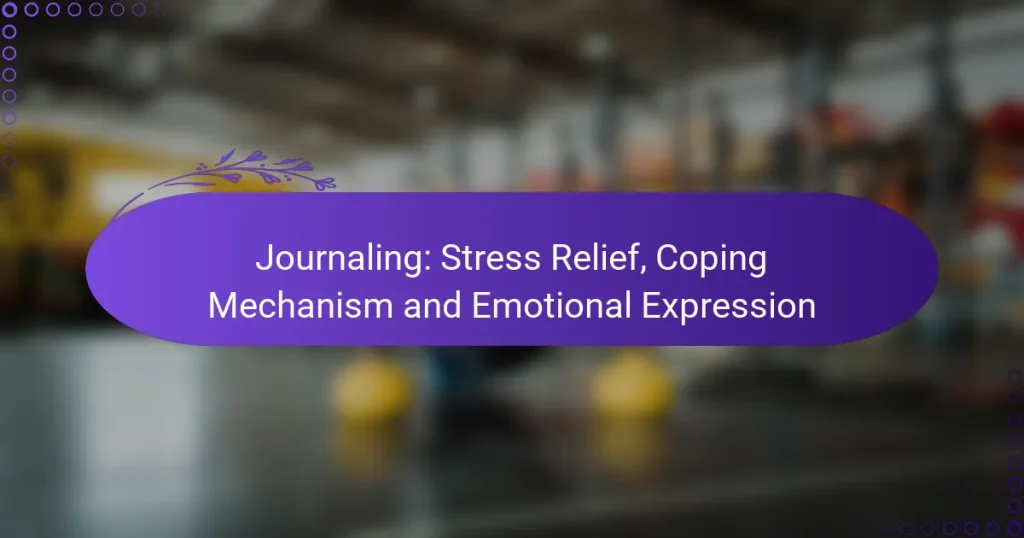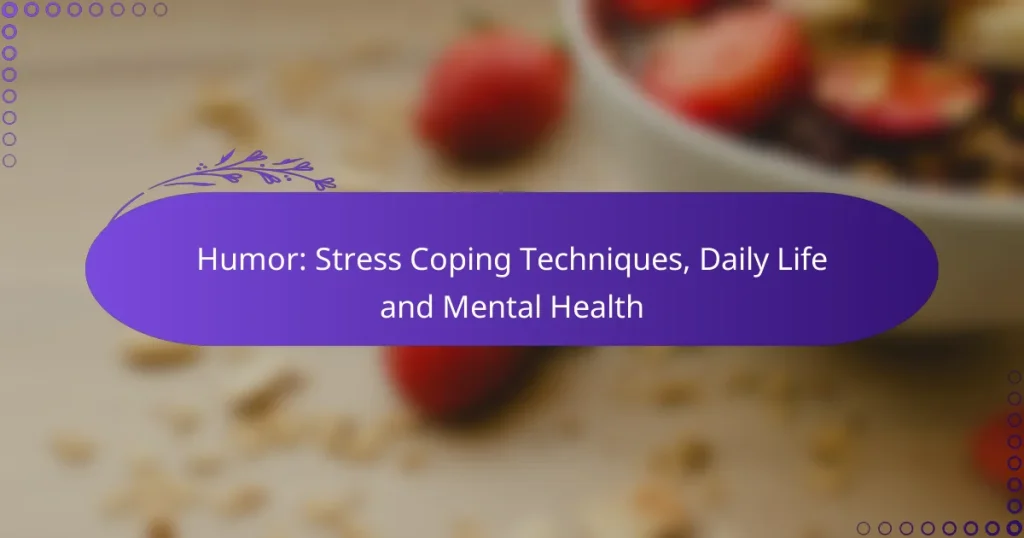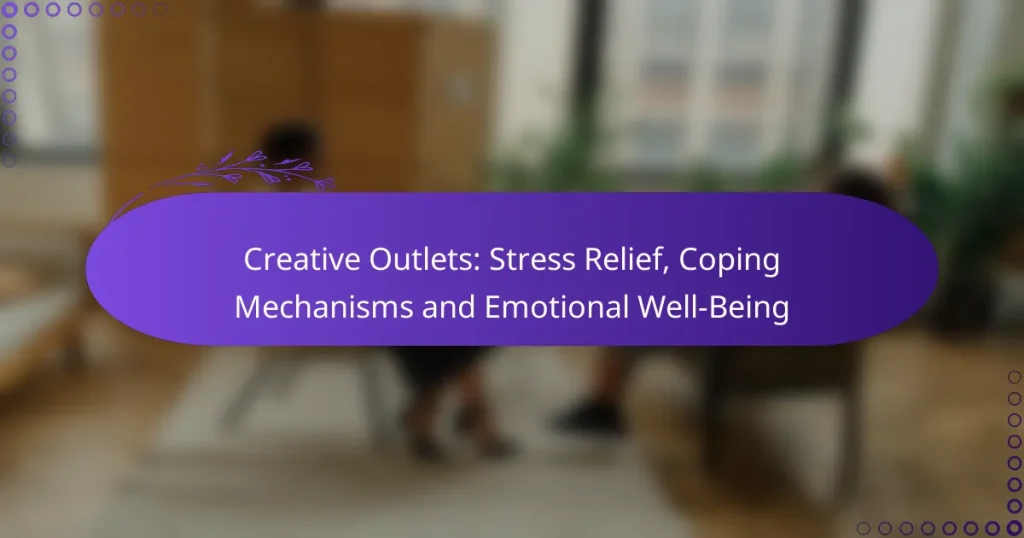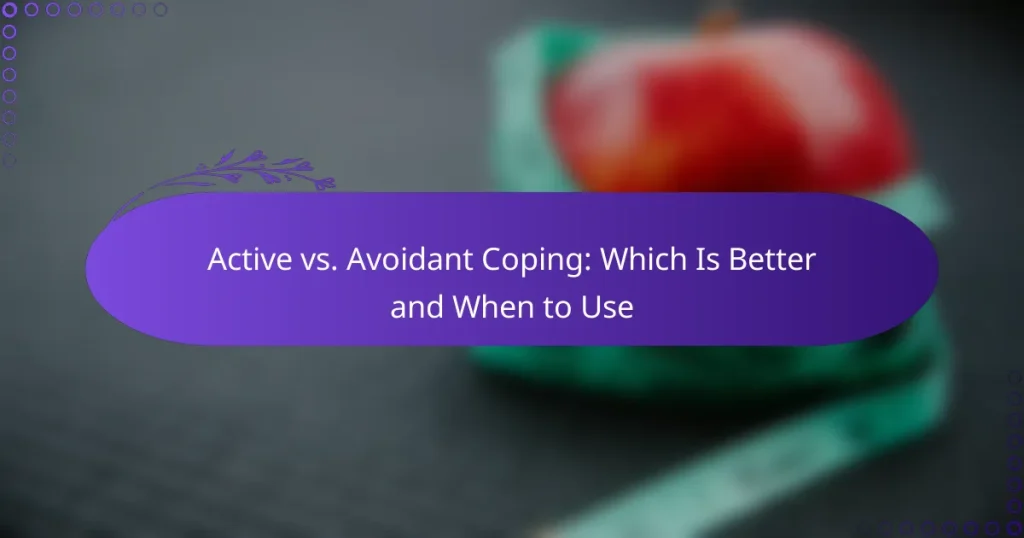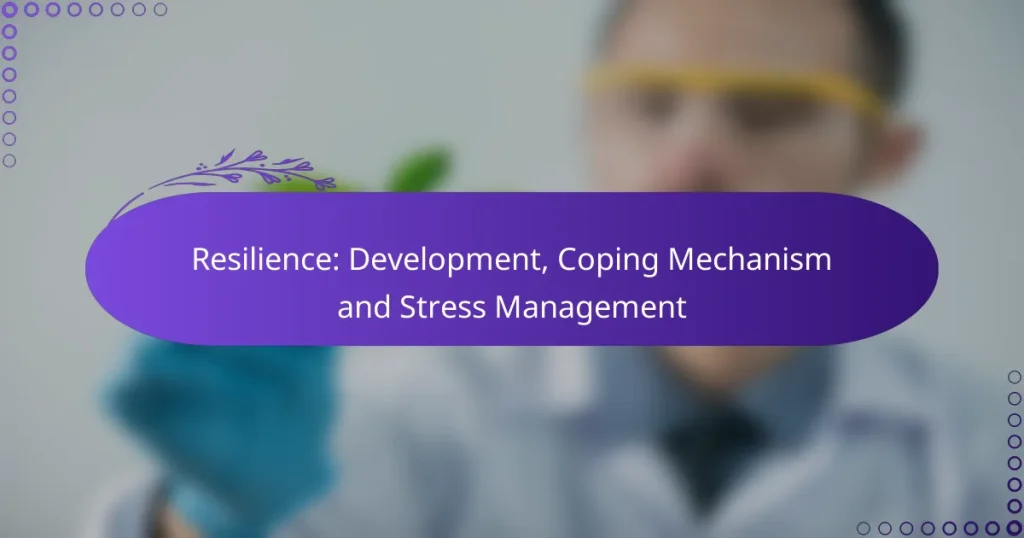In today’s fast-paced world, managing stress is essential for maintaining emotional well-being. Effective coping mechanisms can help individuals navigate stressful situations by promoting resilience and enhancing overall mental health. From mindfulness practices to physical exercise, these strategies can be easily integrated into daily life to foster a calmer and more balanced mindset.
Humor: Stress Coping Techniques, Daily Life and Mental Health
Coping with Stress: Major Life Changes, Individual Strategies and Support
Creative Outlets: Stress Relief, Coping Mechanisms and Emotional Well-Being
Active vs. Avoidant Coping: Which Is Better and When to Use
Coping Strategies: Work Environment, Stress Relief and Resilience
Resilience: Development, Coping Mechanism and Stress Management
What are effective coping mechanisms for stressful situations?
Effective coping mechanisms for stressful situations include techniques that help manage stress and promote emotional well-being. These strategies can be practical, easy to implement, and tailored to individual preferences.
Mindfulness meditation
Mindfulness meditation involves focusing on the present moment and observing thoughts and feelings without judgment. This practice can reduce stress by promoting relaxation and enhancing self-awareness.
To start, find a quiet space, sit comfortably, and concentrate on your breath. Aim for sessions of 10 to 20 minutes daily, gradually increasing the duration as you become more comfortable with the practice.
Physical exercise
Physical exercise is a powerful stress reliever that boosts endorphins, helping to improve mood and reduce anxiety. Engaging in regular physical activity, such as walking, jogging, or yoga, can significantly enhance your resilience to stress.
Try to incorporate at least 150 minutes of moderate aerobic activity each week. Choose activities you enjoy to make it easier to stick with your routine.
Deep breathing techniques
Deep breathing techniques can quickly calm the mind and body during stressful moments. By focusing on your breath, you can activate the body’s relaxation response, reducing tension and anxiety.
Practice deep breathing by inhaling slowly through your nose for a count of four, holding for four, and exhaling through your mouth for a count of four. Repeat this cycle for several minutes to help regain a sense of calm.
Time management strategies
Effective time management strategies can alleviate stress by helping you prioritize tasks and reduce feelings of overwhelm. Organizing your schedule can lead to a more balanced life and improved productivity.
Consider using tools like to-do lists or digital planners. Break tasks into smaller, manageable steps and set realistic deadlines to maintain focus and motivation.
Social support networks
Social support networks play a crucial role in coping with stress. Connecting with friends, family, or support groups can provide emotional comfort and practical assistance during challenging times.
Make an effort to reach out to your support network regularly. Engaging in conversations, sharing experiences, and seeking advice can foster a sense of belonging and help you navigate stressful situations more effectively.
How can mindfulness help in stress management?
Mindfulness can significantly aid in stress management by promoting awareness and acceptance of the present moment, reducing negative thought patterns. By practicing mindfulness techniques, individuals can cultivate a calmer mindset and develop resilience against stressors.
Reduces anxiety
Mindfulness helps reduce anxiety by encouraging individuals to focus on the present rather than worrying about the future. Techniques such as deep breathing and body scans can ground a person, allowing them to observe anxious thoughts without judgment.
Regular mindfulness practice can lead to a decrease in anxiety symptoms, often resulting in improved overall mental health. For instance, spending just a few minutes daily on mindfulness exercises can yield noticeable benefits over time.
Enhances emotional regulation
Mindfulness enhances emotional regulation by fostering a greater awareness of one’s emotional responses. This awareness allows individuals to pause and choose how to react to stressors, rather than responding impulsively.
Practicing mindfulness can lead to improved emotional resilience, helping individuals manage their feelings more effectively. Simple techniques, like mindful journaling or meditation, can be integrated into daily routines to strengthen this skill.
What role does physical exercise play in coping with stress?
Physical exercise is a powerful tool for managing stress, as it helps reduce tension and improve mood. Engaging in regular physical activity can lead to significant improvements in overall mental well-being.
Releases endorphins
One of the primary benefits of physical exercise is the release of endorphins, which are chemicals in the brain that act as natural painkillers and mood elevators. This release can create a feeling of euphoria often referred to as the “runner’s high.” Activities such as running, cycling, or even brisk walking can trigger this response.
To maximize endorphin release, aim for at least 30 minutes of moderate to vigorous exercise most days of the week. This can include various forms of aerobic exercise, strength training, or even dancing.
Improves sleep quality
Regular physical activity can significantly enhance sleep quality, which is crucial for stress management. Exercise helps regulate the body’s circadian rhythms, leading to deeper and more restorative sleep. This can help reduce feelings of anxiety and improve overall mood.
For optimal sleep benefits, try to finish exercising at least a few hours before bedtime. Engaging in activities like yoga or stretching in the evening can also promote relaxation and prepare the body for sleep.
What are some time management strategies for reducing stress?
Effective time management strategies can significantly reduce stress by helping individuals prioritize tasks and allocate their time efficiently. By implementing these strategies, you can create a structured approach to your responsibilities, leading to a more manageable workload and less anxiety.
Prioritization techniques
Prioritization techniques involve identifying which tasks are most important and need immediate attention. One common method is the Eisenhower Matrix, which categorizes tasks into four quadrants based on urgency and importance. This helps you focus on what truly matters rather than getting lost in less critical activities.
Another effective technique is the ABCDE method, where you label tasks as A (most important), B (important), C (nice to do), D (delegate), or E (eliminate). This clear classification allows you to concentrate your efforts on high-priority items, reducing overwhelm and enhancing productivity.
Setting realistic goals
Setting realistic goals is crucial for effective time management and stress reduction. Goals should be specific, measurable, achievable, relevant, and time-bound (SMART). This framework ensures that your objectives are clear and attainable, minimizing the risk of frustration and burnout.
When establishing goals, consider breaking larger projects into smaller, manageable tasks. This approach not only makes the workload feel less daunting but also provides a sense of accomplishment as you complete each step. Regularly reviewing and adjusting your goals can also help you stay aligned with your priorities and reduce stress levels.
How can social support alleviate stress?
Social support can significantly reduce stress by providing individuals with a network of people who offer emotional and practical assistance. This support helps individuals feel understood and less isolated, which can lead to improved mental health outcomes.
Provides emotional comfort
Emotional comfort from social support comes from sharing feelings and experiences with trusted friends or family. This connection can validate one’s feelings, making them feel less alone in their struggles. For example, simply talking to a friend about a stressful day can lighten the emotional load.
Additionally, expressing emotions can lead to catharsis, which is the release of pent-up feelings. This process can help individuals process their experiences and reduce anxiety, leading to a more balanced emotional state.
Encourages positive coping behaviors
Social support encourages individuals to adopt healthier coping mechanisms rather than resorting to negative behaviors like substance abuse or withdrawal. Friends and family can motivate each other to engage in activities such as exercise, hobbies, or mindfulness practices, which are beneficial for stress management.
Moreover, having a supportive network can provide accountability. For instance, a friend might encourage you to join a yoga class or participate in a community event, fostering a sense of belonging and reducing stress levels. This positive reinforcement can be crucial in maintaining long-term mental well-being.
What are the signs of stress that require coping mechanisms?
Signs of stress can manifest in various ways, indicating the need for effective coping mechanisms. Recognizing these signs early can help individuals manage their stress levels and improve their overall well-being.
Physical symptoms
Physical symptoms of stress often include headaches, muscle tension, fatigue, and changes in sleep patterns. These manifestations can vary in intensity and may lead to chronic health issues if not addressed. For instance, persistent headaches or insomnia can significantly impact daily functioning.
Common physical responses to stress can also involve gastrointestinal issues, such as stomachaches or changes in appetite. It’s essential to monitor these symptoms and seek professional help if they become severe or persistent.
Emotional changes
Emotional changes due to stress can include feelings of anxiety, irritability, or mood swings. These shifts can affect relationships and overall quality of life. Individuals may find themselves feeling overwhelmed or unable to concentrate, which can exacerbate stress levels.
Additionally, prolonged stress can lead to feelings of hopelessness or depression. Recognizing these emotional signs is crucial for implementing coping strategies, such as seeking support or engaging in relaxation techniques.
How can one choose the right coping mechanism?
Choosing the right coping mechanism involves understanding your personal stressors and identifying strategies that effectively address them. Consider your emotional responses, the context of the stress, and the potential long-term effects of each coping method.
Identify your stressors
Recognizing the specific sources of stress is crucial for selecting appropriate coping mechanisms. Common stressors include work pressure, personal relationships, and financial concerns. Take time to reflect on what triggers your stress and how you typically respond to these situations.
Evaluate coping options
Different coping mechanisms can be categorized as problem-focused or emotion-focused. Problem-focused strategies aim to tackle the source of stress directly, such as time management or seeking support. Emotion-focused strategies, like mindfulness or deep breathing, help manage emotional responses. Weigh the pros and cons of each option based on your situation.
Consider your personality
Your personality traits can influence which coping mechanisms will be most effective. For example, extroverts may benefit from talking through their stress with friends, while introverts might prefer solitary activities like journaling or meditation. Tailor your approach to fit your individual preferences and comfort levels.
Test and adjust
Implementing a coping mechanism is often a trial-and-error process. Start with one or two strategies, and assess their effectiveness over time. If a method isn’t working, don’t hesitate to adjust or try something new. Flexibility is key to finding what truly helps you manage stress.
